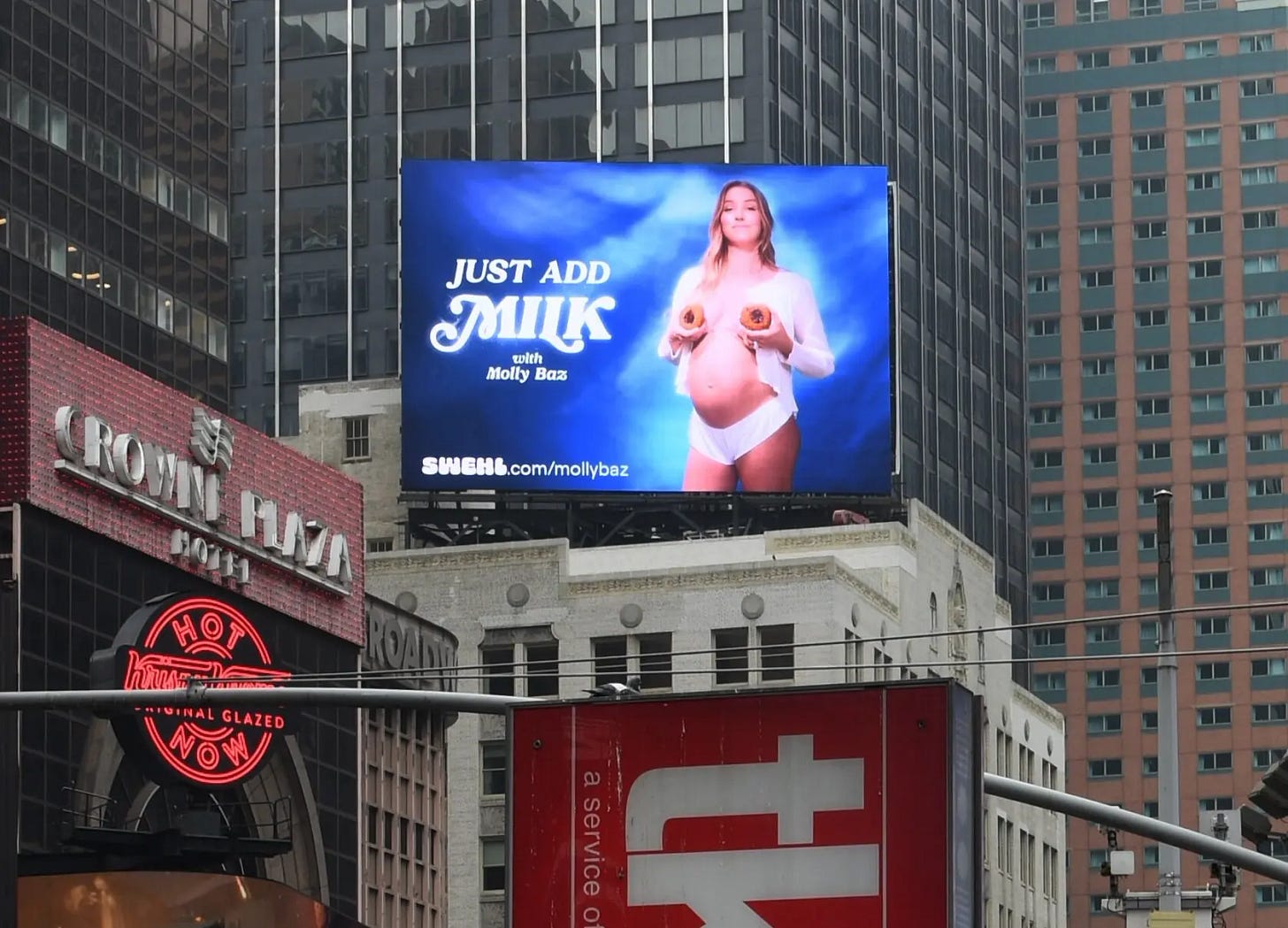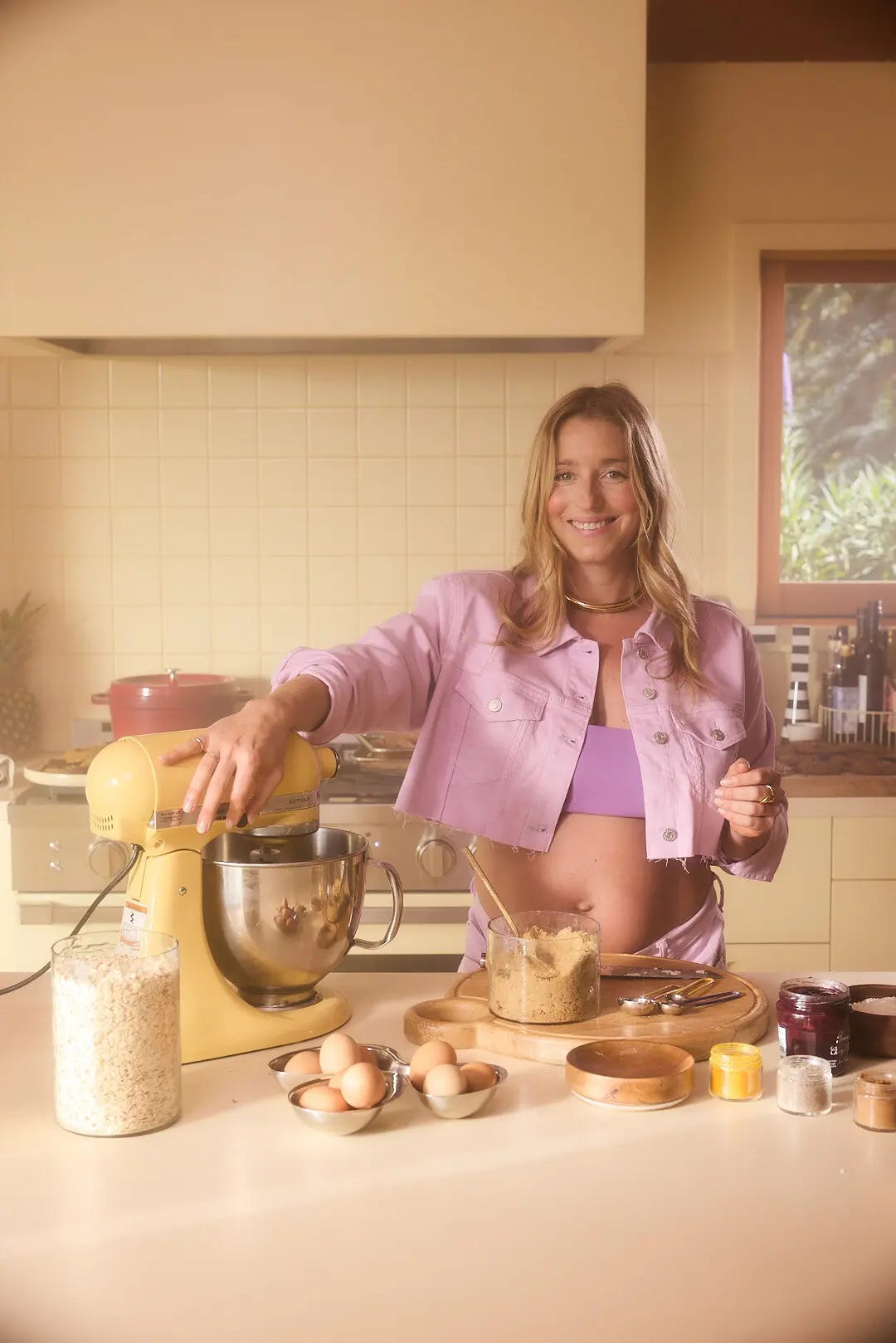Cover Those Cookies, Ma'am!
A Times Square Ad was deemed too provocative as cookbook author Molly Baz promotes her recipe for lactation cookies
I guess you can assume that a cookbook advertisement was too spicy and on-the-nose.
Imagine a digital billboard in Times Square, a towering 45 feet, displaying Molly Baz, a cookbook author, holding two oatmeal cookies over her chest, her pregnant belly exposed. The ad, tagged “Just Add Milk,” promoted Molly’s lactation cookie recipe, a collaboration with breastfeeding company Swehl. The ad was scheduled for a week, from Monday through Mother’s Day, playing for the first minute of every hour. However, the controversial image was replaced after three days, allegedly for violating “guidelines on acceptable content,” which, as some critics argue, may reflect societal discomfort with the portrayal of women's bodies and pregnancy in public spaces. The day the billboard was replaced happened to be Molly’s birthday, and the representatives from Swehl tried to keep the news from her for as long as they could.
Brex, the company that sponsored Swehl's billboard, said the ad was removed following a message from Clear Channel, which owns the digital billboard. According to Brex, Clear Channel said the image depicted was "flagged for review." Brex said in a statement:
"Brex deeply believes in Swehl's mission; therefore, we approved the creative on our side and secured the ad space so they could run it in Times Square. In fact, we buy billboards for many of our customers through our Brex card rewards program - most of whom wouldn't be able to access them otherwise. We had been running the Swehl ad for several days when we received a message from Clear Channel noting that the ad was 'flagged for review.'"

The photo change raises some questions about a double standard in advertising. Victoria’s Secret, Kim Kardashian’s Skims, and other underwear ads have previously run in Times Square. But as Molly put it, somehow, her photo was “a little too much” for people to handle. One of Swehl’s co-founders said this situation shows the “systemic shame of our bodies and breasts at the highest levels.”
The advertising industry has been hesitant to address women's health issues, which has resulted in several instances of censorship. It was only in 2017 that an advertisement for period products was finally allowed to show red liquid instead of blue, which had been considered more acceptable. In 2020, an ad by Frida, a mother and baby care brand, was rejected from airing during the Oscars for realistically depicting the pain of postpartum recovery. Additionally, social media platforms frequently censor online content related to women's health or breastfeeding, as exemplified by Tommee Tippee's campaign "Boob Life," which featured realistic breastfeeding vignettes and breasts.
However, the rejection of ads can sometimes lead to a surge in publicity, thanks to the power of social media. For instance, in 2015, Thinx, a period underwear brand, claimed that New York City's subway system would reject ads featuring a suggestive pink grapefruit or a runny egg yolk. This sparked a heated discussion on Twitter and in the news media, and eventually, the ads were allowed to run. Similarly, Tommee Tippee was able to bring back its Boob Life campaign on specific social media sites after receiving backlash for its initial rejection.
As of today, Molly Baz is speaking out following the controversy, saying:
“It's super disheartening and infuriating to me that my, kind of, first public foray into being a public mother was one that was deemed inappropriate […] From my perspective, the imagery that we put together was no different from any of the other ads that are in Times Square […] We wanted a picture that showed a woman that was really empowered in her pregnancy, and so there were a lot of different poses and stances, and the one that we chose is one where I am fully belly out ... holding these two cookies […] We're going to keep amplifying this message that women and their pregnant bodies and everything that pregnancy and breastfeeding entails is something to celebrate.”



Refreshing to see commentary exposing that nice quiet double standard operating when it comes to women’s issues.
Cool and refreshing!